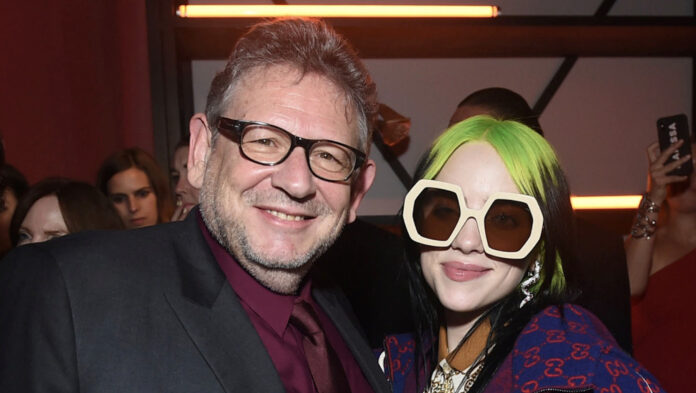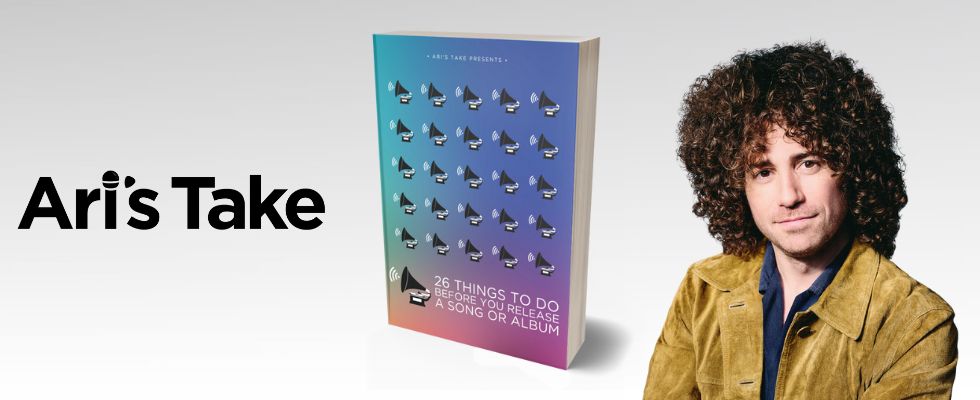Did you know that there is a law on the books in California that states a company cannot bind someone to a personal services agreement for longer than 7 calendar years – unless they are a RECORDING ARTIST?!
That’s right, in 1987 the slimy, slippery, soulless major record labels successfully lobbied the California legislature to add an amendment to exempt recording artists from this law meant to protect people from long-term, predatory contracts.
But finally, California might have a chance to right these historic wrongs.
There is a Bill that has been introduced in the California State Assembly by Assemblymember Ash Kalra, AB 2926, which would remove this exemption and protect all musicians in California from predatory label contracts that many musicians sign when they’re too young or inexperienced to know any better.
Let’s step back. What’s going on here?
Have you ever seen a major record contract? I have. It’s 100 pages long, filled with legalese meant to confuse, convolute and essentially strip all rights and freedom from artists.
Most major label contracts not only keep around 82% of master revenues, because of the 360 deal, labels are keeping a portion of the entire artists’ career earnings – from every earning avenue. Oh, and of course, artists rarely actually get their 18% because the labels employ sneaky accounting to prevent artists from ever recouping their advance (to pay off the “loan” that the label gave the artist when they signed).
“When you sign a record deal you should assume that could be the last check you see.”
– Talya Elitzer, former Capitol Records A&R
+Because Labels Don’t Develop Artists, godmode Steps In
Even though we now live in a singles economy with streaming now accounting for 65% of global recorded revenue, many major label contracts still deal in “albums.”
Many major label contracts keep artists locked into their deal for what could be up to 10 albums. Not years. Albums! The artist doesn’t get to walk away if they want. Only the label can decide if they want to have the artist make more albums or cut them free.
The issue is, however, labels can also prevent their artists from releasing albums to keep them locked into the contract – like what happened to JoJo who was held hostage for 7 years by her label who rejected every album JoJo turned in.
See, if you have a hit, it’s to the label’s benefit to keep you under their contract for as long as possible no matter what. And they’ll do whatever it takes. Including changing the law.
What is an album anyway in the streaming era? Well, according to Megan Thee Stallion, who is currently in a legal battle with her label over the definition, it’s at least 45 minutes of studio recorded material.
However, labels find tricky ways to reject albums (even if they release them!).
Artists who turn in singles, EPs, collab albums, (and even 21 track albums – like Megan Thee Stallion) may not get these masters counted towards their album quota – keeping them bound to the label for even longer.
It’s to a label’s benefit to prevent their artists from reaching their required album quota to keep the artist contractually bound to the label for as long as possible.
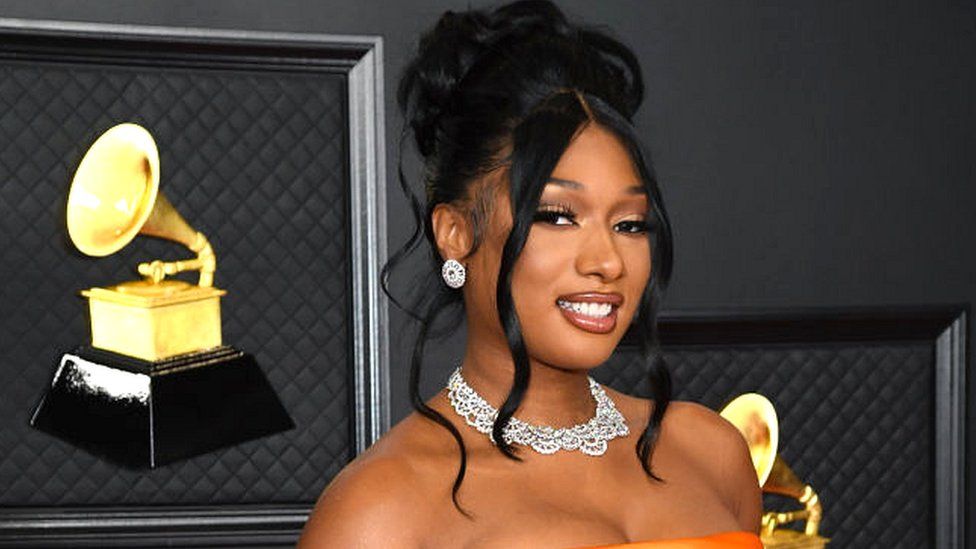
“When I signed, I didn’t really know what was in my contract. I was young. I think I was like 20, and I [didn’t] know everything that was in my contract.”
– Megan Thee Stallion
Literally no one knows everything that’s in their major label contract – other than the attorneys who wrote or negotiated it.
It’s 100 pages long! Of legalese! Who can comprehend that? I literally wrote a book on the music business and it makes my head spin reading just 3 pages of that nonsense.
These major label contracts have gotten out of hand. And when corporations get out of hand and start abusing the public, it’s up to the government to step in to protect its vulnerable citizens.
The California bill AB-2926 (Kalra) would do just this.
This bill would make sure that every California musician is treated the same as every other Californian who enters into a personal service contract.
There is absolutely no reason for musicians to be treated differently than every other individual – other than to keep lining the major labels’ pockets. (Which mind you, major labels made nearly $19 billion in 2021. They’re doing just fine).
“Artists should not be the only people who are excluded from California’s protection against contracts longer than 7 years. Most artists have never been respected or treated as partners, just products, which makes it easier to perpetuate this unjust practice. Artists aren’t looking for more, just the same protection as everyone else in the state.”
– Willie “Prophet” Stiggers, co-chair of Black Music Artists Coalition
“Artists aren’t looking for more, just the same protection as everyone else in the state.”
Unfortunately, this bill seems to be dead in the water. Why? Because the RIAA (the organization that represents the major labels) have put a lot of money into convincing California legislators that they need this exception.
The majors are claiming that it takes longer than 7 years to develop an artist. Ok, first off, since when do major labels develop artists? That’s cute, guys.
Anyone who has spent longer than 5 minutes in the new music business understands that the majors ain’t signing anything unless it’s already proven – or backed by a hit producer.
“The major labels are not in the business of developing artists.”
-Talya Elitzer, former Capitol Records A&R
Long gone are the days where Columbia Records will invest in Bruce Springsteen and have two albums flop, but stick it out because they believe in him. If you don’t get a hit on your first single now, you’re through! But of course the majors will continue to own your masters in perpetuity (and thanks to the 360 deal – much of your touring, merchandise, sponsorship, and anything else you can earn on including NFTs).
The major labels don’t treat their artists as creative human beings. They treat them as products.
They’ve gone as far as to argue to lawmakers that freeing artists from this situation ought to constitute an unconstitutional taking of private property under the 5th Amendment. They are saying the quiet part out loud.
“Record contracts are just like slavery. I would tell every artist not to sign.”
– Prince
The labels, via the RIAA and other ignorant tech writers, are making claims that are just completely removed from reality. They even convinced the Arts committee last year to kill this bill when it was being considered because, according to them, these gigantic corporations deserve protections under California law, and individual human beings do not.
I’d like to believe that this year’s chair of the Arts committee, Tasha Boerner Horvath, will support musicians over multi-billion dollar corporations. She has the power to push this bill through.

“Without artists, there would be no music industry. It’s indefensible that record companies are still holding artists hostage in outdated, never-ending deals because of some stupid CA law put into effect by the major record companies ironically.”
— deadmau5 and owner of independent record label, mau5trap
These people would like you to think that it’s the 1990s and that you need a major label to be a successful musician. Guess what? You don’t! There are literally thousands of middle class musicians making a living without the need of a major label. We are in the New Music Business where you don’t need to sign to a label to build a successful career.
And the majors know that. And continue to lose market share every year to the DIY, self-released artists and indie labels. So they’re doing everything in their power to milk the artists they actually can get to sign to them. Most of these artists are young and from underserved communities. AKA Black.
Just look at the charts! Who’s in the top 100? Mostly black artists signed to major record deals.
This new bill would prevent the labels from suing artists for “potential lost profits” – i.e. made up money they think they could have made had they kept their artists under lock and key.
They would also like you to believe that the major labels need 7+ years with an artist to turn a profit. This is completely bogus. First off, if the artist isn’t profitable within the first year, they’re dropped. Moot point. That’s just how it works now.
I challenge any major label to point to an artist signed within the past decade who was kept under contract for 7+ years without turning a profit.
They can’t. Because it doesn’t exist. If you’re an artist who doesn’t turn a profit in year one, you’re done.
Not only that, the majors get the benefit of being able to negotiate major payoffs (bribes) from giant tech firms like TikTok, Facebook, Twitch in order to grant them licenses for their catalogs. In 2021 this amounted to $1.5 BILLION – with a B. How much of that trickled down to their artists? Or counted against their recoupment?
Listen up!
There is absolutely no reason for musicians to be treated differently than literally every other working person in the state.
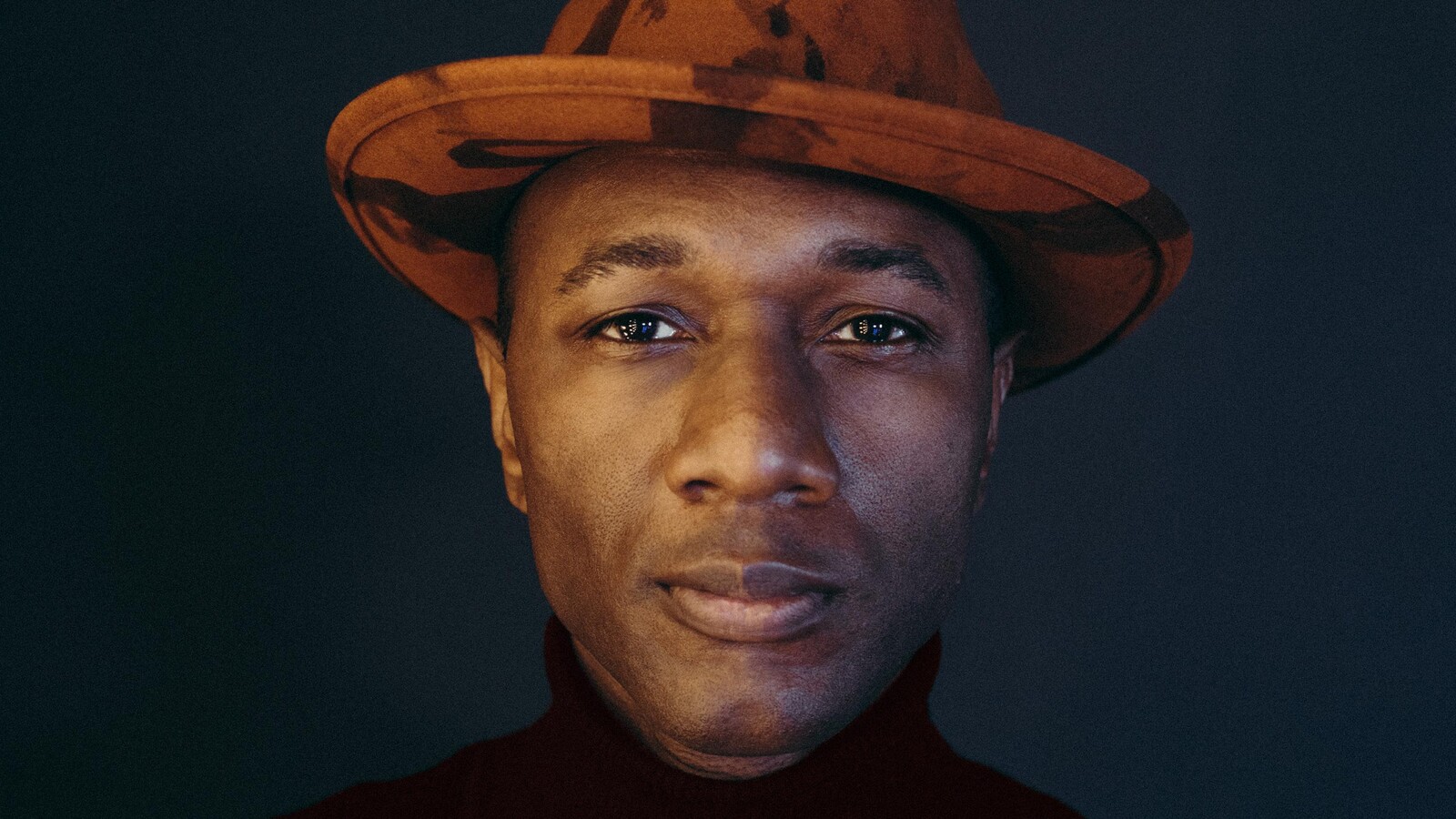
“As a recording artist, I call upon our label partners to work with us in the fight for FAIR. Gone are the days where labels need five exclusive albums to turn a profit. Labels are hugely profitable in the new music economy while many artists continue to struggle financially. FAIR is an important and overdue change to an antiquated law that will help the entire music ecosystem.”
— Aloe Blacc
We need to protect all of the artists who get bullied into these predatory deals and then have no recourse once they realize what happened.
We need to make noise! This bill WILL ONLY PASS if we make ourselves known!
Remember what we did with AB5 two years ago? WE CHANGED A FUCKING LAW!
+Finally, the California Music Industry Gets Relief Under AB5
There are 2 things you need to do RIGHT NOW:
- Sign this Petition. Last time, the only way we were granted meetings with all of the legislators was because we had the power of the petition. It works! Please sign it.
- Post this on IG:
You can caption it with something like:
Please support #CAFairAct AB2926 to improve the lives of working musicians. The major labels want to make sure that their predatory contracts keep their artists locked-into unethical deals with no recourse when things go wrong. The Fair Act protects musicians from giant corporations that abuse their power. @asmtbh @asmvallardes, @asmrichardbloom @steven_choi68, Asm. Laura Friedman and @adrin.nazarian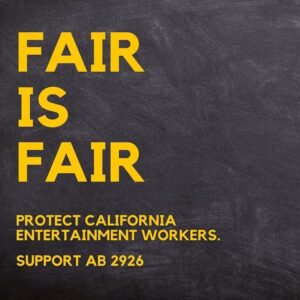
Tweet them:
I’m a working class musician and I’m asking you to please support #CAFairAct AB2926. Are you with the major label, billion dollar corporations or with working musicians? @AsmTbh, @suzettemartinez, @AsmRichardBloom,
@AsmStevenChoi68, @laurafriedman43 @adrin_nazarian - Send your rep a letter. It’s super easy, one click, through this link.
We have the opportunity to help the next generation of artists. And support the current generation of artists who are being taken advantage of and held hostage by their labels.
We can do this. But we need your help.
Let’s fucking go!













